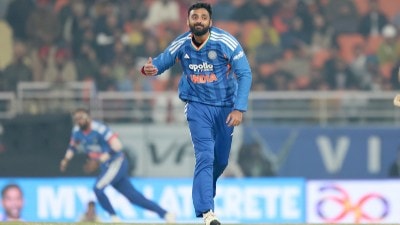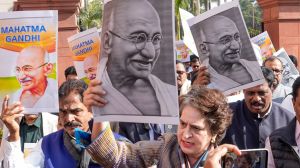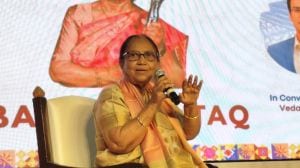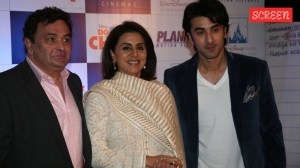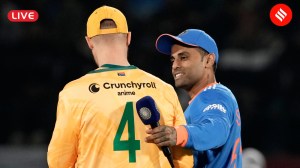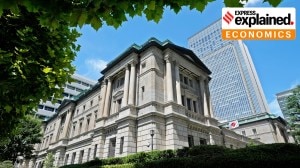Manohar Joshi passes away: Maharashtra’s first non-Congress CM, former LS Speaker was Bal Thackeray’s loyal aide
Captivated by Thackeray’s “Marathi manoos” pitch, Joshi joined the Sena in the 1960s; he was named in the Srikrishna report on the Mumbai riots of 1992-‘93 along with his mentor
 Manohar Joshi, the first non-Congress CM of Maharashtra and a loyal follower of Shiv Sena founder Bal Thackeray, passed away at 86. (Express Archives)
Manohar Joshi, the first non-Congress CM of Maharashtra and a loyal follower of Shiv Sena founder Bal Thackeray, passed away at 86. (Express Archives)Former Lok Sabha Speaker and Maharashtra Chief Minister Manohar Joshi, the first CM to lead a non-Congress government, breathed his last at a Mumbai hospital at 3 am on Friday. He was 86.
Joshi was from the village of Nandavi in Raigad and came to Mumbai, then Bombay, in his youth to pursue his studies and a career. But he got into politics, mesmerised by the “son-of-the-soil” politics of Shiv Sena founder Bal Thackeray who became his mentor. Loyal to the Thackerays till the end, Joshi was an ardent follower of Thackeray and though often publicly admonished by him, he never left his side, responding to the Sena leader’s rebukes by saying, “Balasaheb is my leader.” Unsurprisingly, when his chief ministerial tenure was curtailed early, Joshi bowed out without any protest and made way for his successor Narayan Rane in January 1999.
Joshi’s rise in politics was a gradual process. After completing his law degree from Mumbai University, he worked as an officer in Brihanmumbai Municipal Corporation (BMC). He had a nose for business and started the Kohinoor Technical and Vocational Training Institute and later opened Kohinoor Business and Management, with multiple branches in the state. It was during this time that he got inspired by Thackeray’s clarion call to the sons of the soil (the Marathi manoos) to fight for the community.
He first contested the Brihanmumbai Municipal Corporation (BMC) polls and served as a corporator from 1968 to 1972. Four years later, he entered the Legislative Council where he remained till 1989 and in between, from 1976 to 1977, also served as the Mayor of Mumbai. In 1990, Joshi contested the Assembly elections and was elected from Dadar, a constituency he represented till 1999. Dadar was important to the Sena given that it is Marathi-dominated and the party’s headquarters is there.
Joshi along with his mentor Thackeray were accused of inciting violence against Muslims through their speeches during the 1992-’93 Bombay riots, which were triggered by the demolition of the Babri Masjid in Ayodhya, UP. The Srikrishna Commission report named them both but having become the Chief Minister of the first Sena-BJP coalition government in 1995, Joshi rejected the report as “anti-Hindu” and refused to enforce its recommendations.
Sena insiders often talked about the circumstances in which he became a CM on March 14, 1995. Some claimed he outmanoeuvred his uncle and CM front-runner Sudhir Joshi to take the top job as Thackeray saw him as the more shrewd of the two and someone with a business sense. Joshi also had excellent rapport across the political aisle, especially with Sharad Pawar who was then in the Congress.
But the veteran leader did not get along with Deputy CM Gopinath Munde of the BJP and the two were often at loggerheads, clashing during Cabinet meetings. Just months before the Lok Sabha elections, in January 1999, he was made to resign amid controversy over a land deal. The CM was accused of giving a plot of land meant for a school to a builder close to his son-in-law Girish Vyas. He strongly denied the accusation as “political vendetta” but did not protest when Thackeray asked him to step down.
But the Sena founder ensured his close associate would not have to spend time in the political wilderness and that year fielded him from the Mumbai North Central constituency in the Lok Sabha polls. Joshi won and moved to Delhi politics. He served as the Minister of Heavy Industries and Public Enterprise from October 1999 to May 2002 in the Atal Bihari Vajpayee government. Two months earlier, GMC Balayogi of the Telugu Desam Party (TDP) had died in a helicopter crash and, in a move that surprised many in the NDA, Joshi was chosen as his successor. He remained the Speaker till the end of the government’s tenure. His ability to run the House earned him a lot of praise from the members and played a role in shifting the popular perception of the Shiv Sena to a certain extent.
Joshi’s last stint in national politics started in 2006 when he was elected to the Rajya Sabha and he served out his full tenure. Despite moving away from politics in subsequent years, the former CM remained a constant presence at every programme at the Thackerays’ residence “Matoshree”.
Joshi’s wife Anagha passed away in August 2020. He is survived by his son Unmesh and daughters Asmita and Namrata.
- 01
- 02
- 03
- 04
- 05


